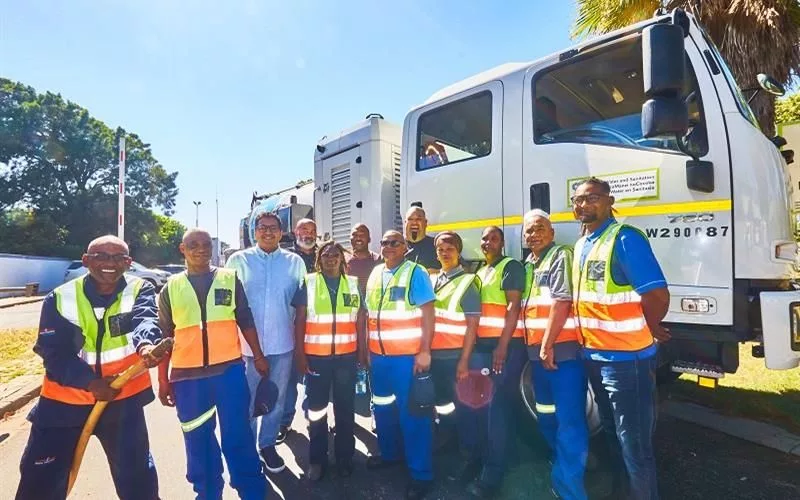The Ad Hoc Joint Committee on Flood Disaster Relief and Recovery was formed to help flood-stricken provinces in South Africa recover from the disaster. The committee traveled to evaluate the impact and make recommendations, including understanding climate change, direct government intervention, preventative measures, and community education. The committee’s report will be presented to the National Assembly and the National Council of Provinces for review and approval, providing solutions to immediate crises and guiding future disaster management strategies.
The Role of the Ad Hoc Joint Committee on Flood Disaster Relief and Recovery in providing strategic recommendations for flood-stricken provinces in South Africa, including direct intervention by the national government and community education and awareness. The committee emphasizes the importance of understanding climate change in addressing flood disasters and preventative measures such as clearing stormwater drainage systems. The outcomes of these efforts will be presented to the National Assembly and the National Council of Provinces for review and approval.
Establishment and Function of the Committee
In response to the catastrophic floods that struck various provinces in 2022 and 2023, an innovative initiative called the Ad Hoc Joint Committee on Flood Disaster Relief and Recovery was established. This committee, founded in the initial stages of 2023, dedicated itself to traversing the flood-stricken provinces to evaluate the aftermath and formulate practical recovery strategies.
The committee’s work extended to provinces profoundly affected by the floods, including KwaZulu Natal (KZN) and others such as the Eastern Cape, North West, Free State, Mpumalanga, and Limpopo. The committee prepared an in-depth report, detailing strategic recommendations for each affected province, taking into account the unique challenges and requirements each region presented.
Recommendations and Insights
The committee emphasized the critical importance of understanding climate change in addressing flood disasters, particularly highlighting this point for Gauteng province. It stressed the necessity for state entities to incorporate a comprehensive understanding of the broader climatic context into all flood disaster response strategies. Only by doing so, can we fully grasp the complexities of the disaster that each flood event presents.
For KZN, a severely impacted province, the committee advocated for a direct intervention by the national government. They suggested a reallocation of disaster funds into indirect grants, which could be judiciously used for the benefit of the municipalities and the province as a whole. The committee believed that this strategy would provide much-needed financial support to the recovery process.
Implementation and Evaluation
The committee also focused significantly on the maintenance of municipal infrastructure in the North West province. It encouraged relevant state departments to focus on preventative measures, such as clearing stormwater drainage systems and culverts, well before the expected rainy seasons.
In the Free State province, the committee underscored the value of community education and awareness. It urged state entities to consistently prepare communities to respond to impending flood disasters, acknowledging the recurring nature of these catastrophes.
For the Eastern Cape, Mpumalanga, and Limpopo provinces, the committee requested comprehensive progress reports on the ongoing flood relief and recovery efforts. This systematic approach, demonstrated by each committee member, mirrored their unwavering dedication to their role.
Leadership and Future Scope
Leading this initiative were Co-Chairpersons Mr Cedric Frolick and Mr Jomo Nyambi. They praised the committee’s relentless efforts, expressing their admiration for the ‘sterling’ work done. The outcomes of these efforts, captured in their extensive report, will be presented to the National Assembly and the National Council of Provinces for review and approval.
The Ad Hoc Joint Committee on Flood Disaster Relief and Recovery serves as a model of coordinated action in the face of calamity. Its journey, filled with obstacles yet marked by firm dedication, is a testament to the strength of collective determination and strategic planning in overcoming natural disasters. The committee’s work not only provides solutions to immediate crises but also serves as a guiding light for future disaster management strategies.
1. What is the Ad Hoc Joint Committee on Flood Disaster Relief and Recovery?
The Ad Hoc Joint Committee on Flood Disaster Relief and Recovery is a committee formed to help flood-stricken provinces in South Africa recover from the disaster.
2. What is the role of the Ad Hoc Joint Committee on Flood Disaster Relief and Recovery?
The role of the Ad Hoc Joint Committee on Flood Disaster Relief and Recovery is to provide strategic recommendations for flood-stricken provinces in South Africa, including direct intervention by the national government and community education and awareness.
3. What provinces did the Ad Hoc Joint Committee on Flood Disaster Relief and Recovery evaluate and prepare recommendations for?
The Ad Hoc Joint Committee on Flood Disaster Relief and Recovery evaluated and prepared recommendations for provinces such as KwaZulu Natal (KZN), Eastern Cape, North West, Free State, Mpumalanga, and Limpopo.
4. What preventative measures did the committee advocate for in the North West province?
The committee emphasized the importance of preventative measures such as clearing stormwater drainage systems and culverts in the North West province.
5. What did the committee recommend for KwaZulu Natal?
The committee recommended a direct intervention by the national government in KwaZulu Natal and suggested the reallocation of disaster funds into indirect grants to support the recovery process.
6. Who are the Co-Chairpersons of the Ad Hoc Joint Committee on Flood Disaster Relief and Recovery?
The Co-Chairpersons of the Ad Hoc Joint Committee on Flood Disaster Relief and Recovery are Mr Cedric Frolick and Mr Jomo Nyambi. They led the initiative and praised the committee’s efforts.








